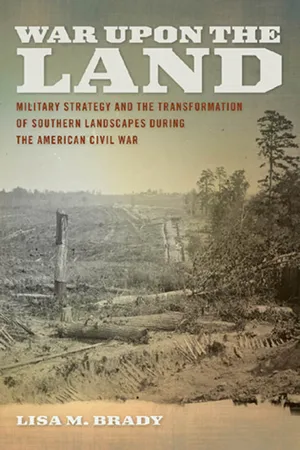
War upon the Land
Military Strategy and the Transformation of Southern Landscapes during the American Civil War
- 208 pages
- English
- ePUB (mobile friendly)
- Available on iOS & Android
War upon the Land
Military Strategy and the Transformation of Southern Landscapes during the American Civil War
About this book
In this first book-length environmental history of the American Civil War, Lisa M. Brady argues that ideas about nature and the environment were central to the development and success of Union military strategy.
From the start of the war, both sides had to contend with forces of nature, even as they battled one another. Northern soldiers encountered unfamiliar landscapes in the South that suggested, to them, an uncivilized society's failure to control nature. Under the leadership of Ulysses S. Grant, William Tecumseh Sherman, and Philip Sheridan, the Union army increasingly targeted southern environments as the war dragged on. Whether digging canals, shooting livestock, or dramatically attempting to divert the Mississippi River, the Union aimed to assert mastery over nature by attacking the most potent aspect of southern identity and power—agriculture. Brady focuses on the siege of Vicksburg, the 1864 Shenandoah Valley campaign, marches through Georgia and the Carolinas, and events along the Mississippi River to examine this strategy and its devastating physical and psychological impact.
Before the war, many Americans believed in the idea that nature must be conquered and subdued. Brady shows how this perception changed during the war, leading to a wider acceptance of wilderness. Connecting environmental trauma with the onset of American preservation, Brady pays particular attention to how these new ideas of wilderness can be seen in the creation of national battlefield memorial parks as unaltered spaces. Deftly combining environmental and military history with cultural studies, War upon the Land elucidates an intriguing, largely unexplored side of the nation's greatest conflict.
Frequently asked questions
- Essential is ideal for learners and professionals who enjoy exploring a wide range of subjects. Access the Essential Library with 800,000+ trusted titles and best-sellers across business, personal growth, and the humanities. Includes unlimited reading time and Standard Read Aloud voice.
- Complete: Perfect for advanced learners and researchers needing full, unrestricted access. Unlock 1.4M+ books across hundreds of subjects, including academic and specialized titles. The Complete Plan also includes advanced features like Premium Read Aloud and Research Assistant.
Please note we cannot support devices running on iOS 13 and Android 7 or earlier. Learn more about using the app.
Information
INDEX
Table of contents
- Cover Page
- Title Page
- Copyright Page
- Dedication
- Contents
- List of Illustrations
- Foreword
- Acknowledgments
- Introduction Nineteenth-Century Ideas of Nature and Their Role in Civil War Strategy
- One Hostile Territory: Union Operations along the Lower Mississippi, 1862—1863
- Two Broken Country: Union Campaigns at and around Vicksburg, 1863
- Three Ravaged Ground: Sheridan in the Shenandoah Valley, 1864
- Four Devoured Land: Sherman’s Georgia and Carolina Campaigns, 1864—1865
- Conclusion Making a Desert and Calling It Peace
- Notes
- Bibliography
- Index